Running a successful business requires more than just offering great products or services. It also involves maintaining a safe and clean environment for both employees and customers. One often overlooked aspect of this is pest control. Regular pest inspections are crucial for businesses as they help identify and address any potential pest-related issues before they become major problems. These inspections ensure that your workplace remains pest-free, ensuring the health and safety of everyone involved. In this article, we will explore the importance of regular pest inspections for businesses and how they contribute to maintaining a thriving and pest-free work environment.
1. Protecting the Health and Safety of Employees and Customers
1.1 Identifying and Eliminating Health Hazards
When it comes to running a successful business, the health and safety of both your employees and customers should be a top priority. Regular pest inspections play a crucial role in identifying and eliminating potential health hazards within your workplace. Pests such as rodents, cockroaches, and flies can carry harmful bacteria and contaminate surfaces, food, and equipment. By conducting regular inspections, you can identify any pest infestations early on and take the necessary steps to eliminate them promptly, ensuring a safe and healthy environment for everyone.
1.2 Minimizing the Risk of Allergies and Asthma
Allergies and asthma are common health conditions that can be triggered by pests such as dust mites, cockroaches, and rodents. These pests produce allergens that can cause respiratory issues and allergic reactions in susceptible individuals. By implementing regular pest inspections, you can minimize the risk of pests that contribute to these conditions thriving in your workplace. Identifying and eliminating the presence of these pests early on can significantly reduce the potential for allergic reactions and asthma attacks among your employees and customers.
1.3 Preventing the Spread of Diseases
Pests can act as carriers for various diseases, posing a significant risk to the health of both employees and customers. For example, flies can transmit diseases like salmonella and E. coli, while rodents can carry diseases such as leptospirosis and hantavirus. Regular pest inspections allow you to identify and address any infestations promptly, minimizing the risk of disease transmission within your workplace. By preventing the spread of diseases, you demonstrate your commitment to the health and safety of your employees and customers.
1.4 Ensuring a Safe and Clean Environment
Maintaining a safe and clean environment is essential for the success of any business. Pests not only compromise the cleanliness of your workplace but also pose safety risks. For instance, rodents can gnaw on electrical wires, potentially causing fires, while pests like termites can damage the structural integrity of your building. Regular pest inspections help to ensure that your workplace remains clean and free from any potential safety hazards. By taking proactive measures to address pest issues, you create a safer environment for both your employees and customers.
2. Preserving the Reputation and Image of the Business
2.1 Avoiding Negative Public Perception
The reputation and image of your business can significantly impact its success. Pests in your workplace can lead to negative public perception and tarnish your brand’s reputation. Whether it’s a customer spotting a cockroach in your establishment or an employee complaining about rodent sightings, such incidents can quickly spread through word-of-mouth or online reviews, impacting your business’s image. Regular pest inspections help to detect and address any pest issues before they become a public concern, allowing you to avoid negative public perception and maintain a positive reputation.
2.2 Maintaining a Positive Online Presence
In today’s digital age, online presence is crucial for the success of businesses. Negative reviews or comments about pests within your workplace can significantly impact your online presence. Regular pest inspections help ensure that your workplace remains pest-free, reducing the likelihood of negative reviews related to pest issues. By maintaining a positive online presence, you attract more customers and establish trust among potential clients who value cleanliness and attention to detail.
2.3 Meeting Regulatory Standards and Requirements
Compliance with regulatory standards and requirements is essential for any business. Many industries have specific regulations regarding pest control and cleanliness. By conducting regular pest inspections, you can ensure that your workplace meets these standards and remains in compliance with regulatory requirements. Failure to comply with such regulations can result in fines, legal liabilities, or even closure of your business. Regular inspections help you stay on top of your regulatory obligations and demonstrate your commitment to maintaining a safe and pest-free environment.
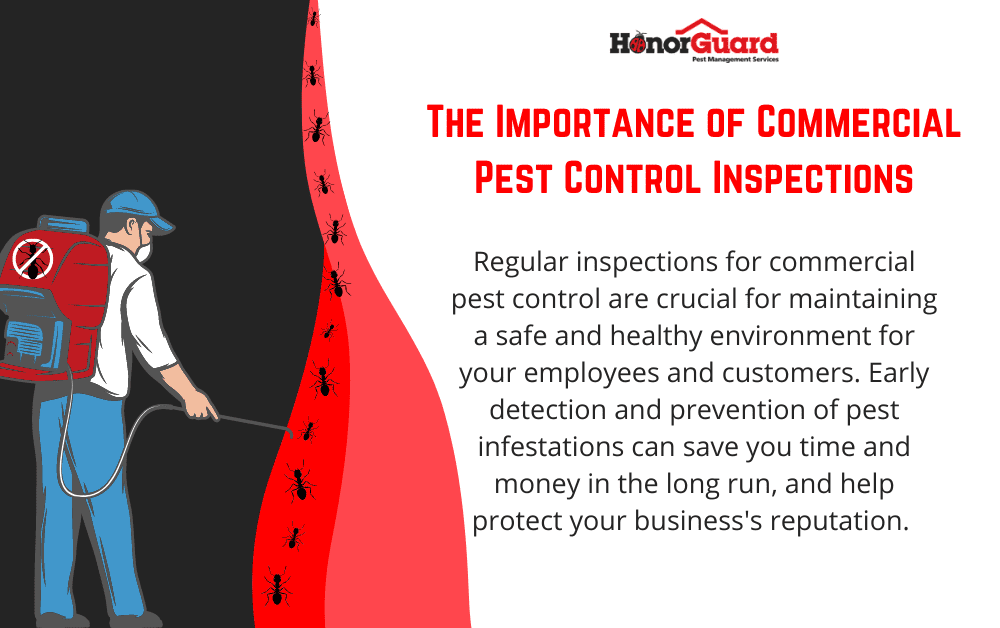
3. Safeguarding Products and Inventory
3.1 Identifying and Preventing Damage to Goods
Pests can cause significant damage to your products and inventory. Rodents, insects, and other pests can chew through packaging, contaminate products, and render them unsellable. Regular pest inspections allow you to identify any signs of pest activity that could potentially damage your goods. By detecting and addressing pest issues early, you can prevent costly damage to your products and ensure that your inventory remains in optimal condition.
3.2 Protecting Against Contamination
Maintaining the quality and safety of your products is crucial for both the satisfaction of your customers and regulatory compliance. Pests can contaminate products with their droppings, urine, or other bodily secretions, posing health risks to consumers. Regular pest inspections help you identify and eliminate any pests that could contaminate your goods, ensuring that your products remain safe and of the highest quality. By safeguarding against contamination, you maintain the trust and loyalty of your customers.
3.3 Minimizing Financial Losses
Pest infestations can lead to significant financial losses for businesses. Not only do pests damage products and inventory, but they can also result in the need for costly extermination services. Regular pest inspections help you minimize these financial losses by allowing you to address pest issues early on. By implementing preventive measures and promptly eliminating pests, you can avoid expensive extermination costs and prevent the need for extensive repairs or replacements of damaged goods.
4. Preventing Structural Damage to the Property
4.1 Detecting and Addressing Infestations
Pests such as termites, carpenter ants, and rodents can cause significant damage to the structure of your building. Termites, for example, feed on wood, compromising the integrity of the building’s foundation and supporting structures. Regular pest inspections enable you to detect and address any infestations before they cause extensive structural damage. By taking proactive measures to protect your property, you save yourself from potentially costly repairs and ensure the longevity of your building.
4.2 Protecting the Building’s Integrity
A structurally sound building is essential for the success of your business. Pests like termites and carpenter ants can weaken the structural elements of your property, potentially leading to dangerous situations. Regular pest inspections help you protect the integrity of your building by identifying and addressing any pest issues that could compromise its structure. By preserving the integrity of your property, you ensure the safety of both your employees and customers.
4.3 Preserving the Longevity of the Property
Investing in regular pest inspections not only helps prevent immediate damage but also contributes to the long-term preservation of your property. By addressing pest issues promptly, you mitigate the risk of long-term damage to the structure, which can decrease the value and longevity of your building. Preserving the longevity of your property not only protects your investment but also ensures the stability and continuity of your business operations.
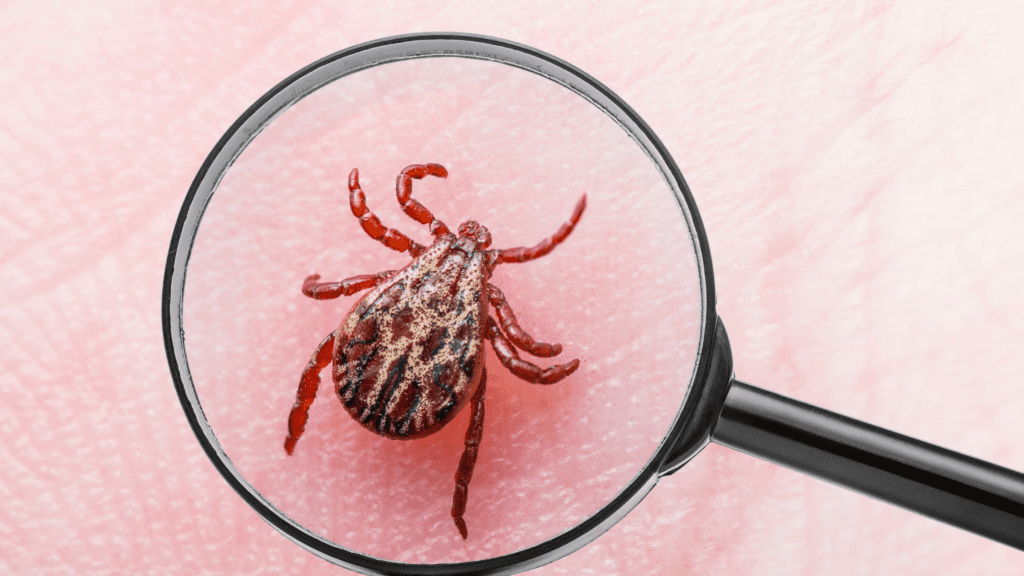
5. Cost-Effective Pest Management
5.1 Early Detection and Intervention
Early detection and intervention are key to cost-effective pest management. Regular pest inspections enable you to identify pest issues in their early stages, making it easier and more cost-effective to address them. By catching pest problems early on, you can take preventative measures and implement targeted treatments that are less expensive and time-consuming compared to extensive extermination services required for large-scale infestations. Taking a proactive approach through regular inspections can save you money in the long run.
5.2 Minimizing the Need for Costly Extermination
Large-scale pest infestations often require costly extermination services to eliminate the problem. By conducting regular pest inspections, you can prevent infestations from reaching this level, thus minimizing the need for expensive extermination treatments. Regular inspections allow for early detection and targeted intervention, reducing the likelihood of costly extermination and helping you manage your pest control budget more effectively.
5.3 Saving on Potential Repair and Restoration Costs
Pests can cause significant damage to property, leading to costly repairs and restoration efforts. Termites, for instance, can cause extensive damage to wooden structures, requiring expensive repairs or replacements. Regular pest inspections help you catch and address pest issues before they cause severe damage, saving you from the financial burden of extensive repairs and restoration. By investing in preventative pest management, you can avoid potentially crippling costs and ensure the financial stability of your business.
6. Compliance with Legal and Insurance Requirements
6.1 Meeting Health and Safety Regulations
Businesses are subject to health and safety regulations that require them to maintain a clean and pest-free environment. Regular pest inspections are essential in meeting these regulatory standards. By conducting inspections, you can identify and address any pest issues that could potentially result in non-compliance. Complying with health and safety regulations not only ensures the well-being of your employees and customers but also protects your business from potential fines or legal liabilities.
6.2 Fulfilling Insurance Policy Conditions
Business insurance policies often require businesses to maintain certain standards, including pest control measures. Regular pest inspections can help you fulfill these insurance policy conditions by demonstrating your commitment to preventing and addressing pest issues. By meeting these requirements, you ensure that your business remains properly insured and protects your financial interests in the event of a pest-related incident.
6.3 Avoiding Legal Liabilities
Failure to address pest issues in your workplace can lead to legal liabilities. Lawsuits resulting from pest-related incidents, such as bites, injuries, or illnesses, can have serious financial and reputational consequences for your business. Regular pest inspections reduce the risk of such incidents by allowing you to identify and address potential pest issues before they escalate. By preventing pest-related legal liabilities, you protect both your business and its stakeholders.
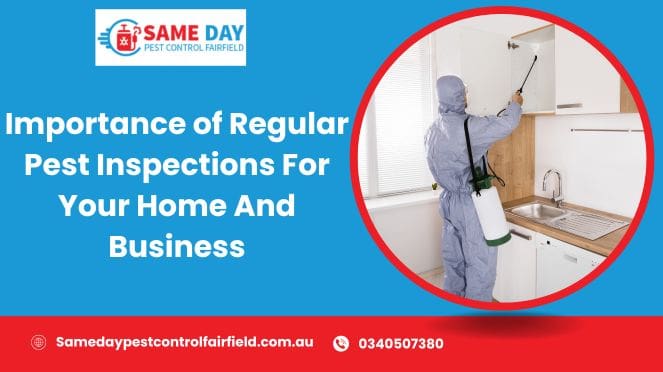
7. Improving Employee Productivity and Morale
7.1 Creating a Comfortable and Pleasant Work Environment
A comfortable and pleasant work environment is essential for the productivity and morale of your employees. Pests in the workplace can be a significant source of discomfort and distraction. Regular pest inspections help to create a comfortable and pleasant work environment by eliminating pests and ensuring a clean and pest-free space. When employees feel comfortable in their work environment, they are more likely to be motivated, focused, and productive.
7.2 Reducing Distractions and Disruptions
Pests can be a major source of distractions and disruptions in the workplace. Whether it’s employees dealing with an infestation or customers being disturbed by pests, such occurrences can disrupt daily operations. Regular pest inspections help identify and eliminate pest issues promptly, reducing the potential for distractions and disruptions in the workplace. By minimizing these disturbances, you provide a conducive environment for your employees to work efficiently and serve your customers seamlessly.
7.3 Boosting Employee Satisfaction
Maintaining a pest-free workplace environment contributes to overall employee satisfaction. When employees feel safe and comfortable at work, their satisfaction and morale significantly increase. Regular pest inspections and prompt pest control measures demonstrate your commitment to creating a conducive work environment that prioritizes the well-being and satisfaction of your employees. By boosting employee satisfaction, you create a positive work culture and increase employee retention rates, ultimately contributing to the success of your business.
8. Enhancing Customer Satisfaction
8.1 Providing a Pest-Free Experience
Customers value cleanliness and expect a pleasant and pest-free experience when they visit your establishment. Pests in your business premises can be a major turn-off for customers, leading to negative experiences and potential loss of business. Regular pest inspections and preventive measures help you provide a pest-free experience for your customers, ensuring their satisfaction and loyalty. By prioritizing customer satisfaction, you establish a strong reputation and build long-term relationships with your clientele.
8.2 Building Trust and Loyalty
A clean and pest-free environment fosters trust and loyalty among your customers. When they feel safe and comfortable in your establishment, they are more likely to return and recommend your business to others. Regular pest inspections demonstrate your commitment to providing a high standard of cleanliness and attention to detail, which builds trust and strengthens customer loyalty. By prioritizing their satisfaction, you establish yourself as a reliable and reputable business in your industry.
8.3 Demonstrating Professionalism and Attention to Detail
Maintaining a pest-free environment showcases your professionalism and attention to detail. Regular pest inspections and preventive measures demonstrate your commitment to upholding the highest standards of cleanliness and hygiene. Customers perceive businesses that prioritize pest control as more professional and reliable. By demonstrating professionalism and attention to detail, you differentiate yourself from competitors and attract customers who value cleanliness and quality.
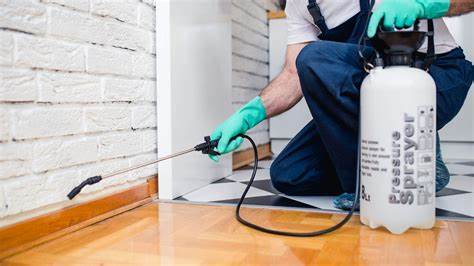
9. Long-Term Pest Prevention and Management
9.1 Implementing Effective Pest Control Strategies
Regular pest inspections are a vital component of effective long-term pest prevention and management. By conducting inspections, you can identify any vulnerabilities or factors that contribute to pest infestations. This allows you to implement targeted pest control strategies that address the root causes and prevent future infestations. By focusing on long-term prevention, you reduce the reliance on reactive pest control measures and ensure a pest-free environment for the sustainable success of your business.
9.2 Regular Monitoring and Inspection
Pests can be persistent, and new infestations can occur over time. Regular monitoring and inspection ensure that your workplace remains pest-free even after initial pest control measures have been taken. By conducting regular inspections, you can detect any signs of pest activity early on and take immediate action to prevent infestations from recurring. Ongoing monitoring and inspection help you maintain a proactive approach to pest management and minimize the risk of future pest-related issues.
9.3 Developing a Customized Pest Management Plan
Every business has unique pest control needs, depending on the industry, location, and other factors. Regular pest inspections allow you to develop a customized pest management plan that addresses the specific requirements of your business. By understanding your vulnerabilities and the factors contributing to pest activity, you can create tailored strategies and preventive measures. A customized pest management plan ensures that your business is protected against pests effectively and optimizes the long-term success of your pest control efforts.
10. Partnering with Professional Pest Control Services
10.1 Leveraging Expertise and Experience
Partnering with professional pest control services brings the advantage of their expertise and experience. Professional pest control technicians have extensive knowledge in identifying and addressing pest issues. By working with experts in the field, you can leverage their experience and ensure that your pest inspections are thorough and accurate. Their expertise helps you implement the most effective pest control strategies and preventive measures, maximizing the impact of your pest management efforts.
10.2 Access to Specialized Tools and Techniques
Professional pest control services have access to specialized tools and techniques that are not readily available to businesses. These tools and techniques enable them to conduct comprehensive pest inspections and implement targeted treatments. By partnering with professional pest control services, you gain access to advanced technologies and practices that enhance the effectiveness of your pest control efforts. This ensures that your inspections are thorough, and any pest issues are addressed with precision.
10.3 Timely Response and Ongoing Support
Pest issues often require prompt action to prevent further damage and minimize the impact on your business. Professional pest control services offer timely response and ongoing support for your pest management needs. Their quick response helps address pest issues promptly, preventing infestations from escalating. Additionally, professional services provide ongoing support through regular maintenance and follow-up inspections, ensuring continuous pest control effectiveness. By partnering with professional pest control services, you have the assurance of timely and consistent support for all your pest management requirements.
In conclusion, regular pest inspections are vital for businesses in various aspects. From protecting the health and safety of employees and customers to safeguarding products and maintaining the reputation of the business, pest inspections play a crucial role. They contribute to cost-effective pest management, compliance with legal and insurance requirements, and the overall improvement of employee productivity and customer satisfaction. By implementing long-term pest prevention and management strategies and partnering with professional pest control services, businesses can ensure a clean, pest-free environment that fosters success and growth.
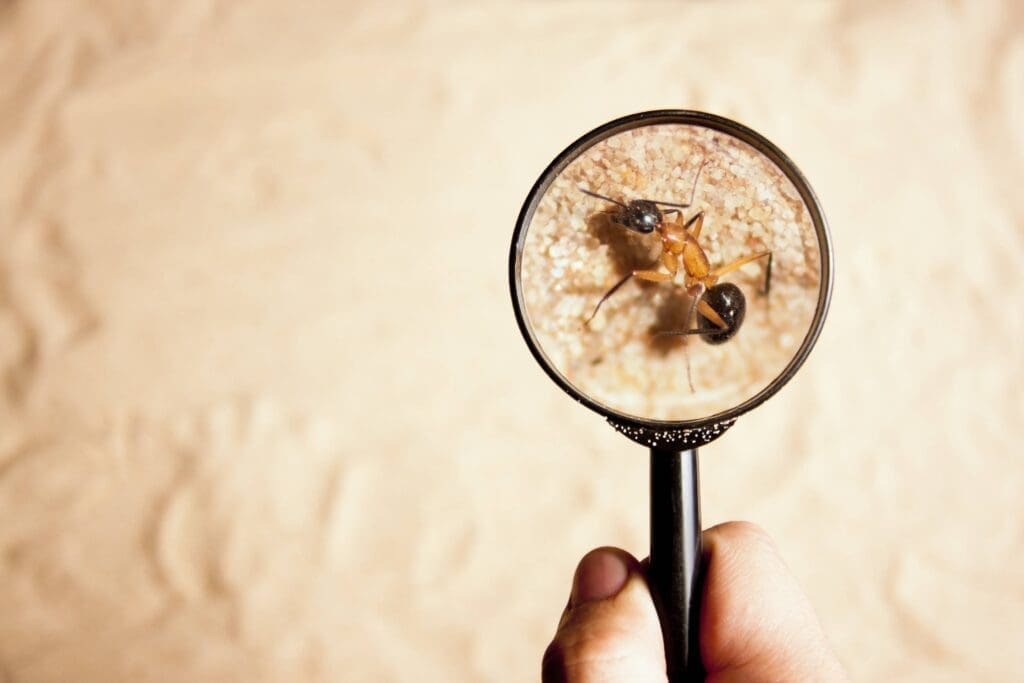

I am Randy, the author behind PestControld.com. Drawing from decades of experience, I aim to provide valuable insights, expert advice, and practical recommendations to help you make informed decisions when assessing viable pest control solutions.